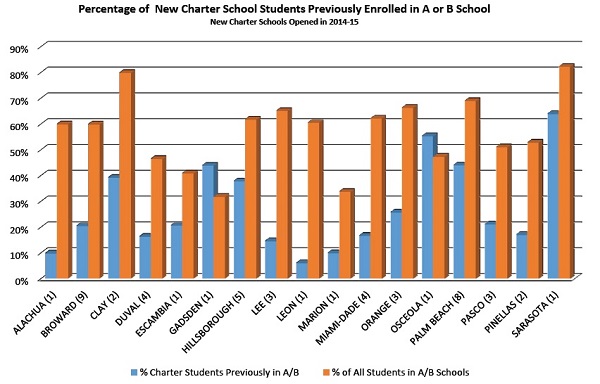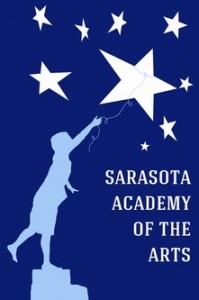We've recently discovered that students who leave private schools for public schools are disproportionately likely to choose charters. But the majority of new charter students are coming from other public schools, so it's also worth looking at what schools they tend to leave behind.
Officials at the state Department of Education recently asked that question for the 50 charter schools that opened in Florida this school year.
According to findings presented recently to state lawmakers, the approximately 10,000 students who enrolled in the state's new charter schools were less likely to come from schools that receive top ratings on the state's accountability system.

Students enrolling in Florida's new charter schools were less likely to come from A or B schools than public school students as a whole. Graph by Florida DOE.
On the other hand, new charter students were not especially likely to come from the lowest-rated schools.
(more…)
The National Alliance for Public Charter Schools yesterday released new numbers showing there are now nearly 3 million students attending more than 6,700 charter schools nationwide.
The statistical sheet breaks out numbers for individual states, and two things jump out looking at the numbers for Florida.
First, the report estimates there are 275,000 students enrolled in Florida charter schools, the largest increase of any state for the 2014-15 school year. That number is an estimate, though, and the latest statistics from the state Department of Education suggest the estimate is high.
Florida charters enroll slightly more than 250,000 students in the current school year, according to preliminary results from the department's fall enrollment survey. The final numbers may look different, but it's unlikely charters' enrollment growth would more than double from what the current figures show.
The alliance's methodology (on page 4) helps explain what's going on. Its estimates are based on historical growth trends, but this year, Florida's charter school growth appears to have slowed.
Second, as shuttered charter schools are coming under greater scrutiny, the alliance's new numbers shed some light on the national picture.
When Sarasota Academy of the Arts opens this fall, the Florida K-8 school still will have the feel of the Julie Rohr Academy, the private school it used to be. Small campus. Small classes. A special curriculum devoted to music and the arts.
 But the new school won’t be a private school. It will be a public charter school.
But the new school won’t be a private school. It will be a public charter school.
The conversion is symbolic of a significant trend coursing through the school choice sector. Private school enrollment is falling. Charter school enrollment is rising. And the potential repercussions – particularly on faith-based schools and the communities that value them – have yet to be fully aired.
The new Sarasota Academy will have state-certified teachers, state-mandated tests and, most importantly, nearly twice as many students. It’s that enrollment boost that led Julie Rohr and her son, Matt McHugh, to make the difficult decision to shut down their family-owned school and apply to become a charter.
“When my mother started our private school 35 years ago, there were five public schools in the area and a couple of private schools,’’ McHugh said. “Now we have charter schools, virtual school – and homeschooling is a big thing now.”
“There are just so many options right now that are free,’’ he said. “And, obviously, that’s a huge challenge for us. We had to figure out how to reach more kids.’’

The Julie Rohr Academy, a 35-year-old private arts school in Sarasota, Fla., will become a public K-8 charter school this fall. Most of the private school students were accepted into the charter, school officials said.
It’s a dilemma shared by private schools in Florida and beyond. Between 2002 and 2010, private school enrollment nationally tumbled from 5.4 million to 4.5 million. Over the same span, charter enrollment climbed from 666,000 to 1.8 million.
A recent U.S. Census Bureau report suggested a correlation. Parents send their kids to private schools for advanced programs, extracurricular activities, small class sizes and other perks easily found today in charter schools that don’t charge tuition, the report noted.
There’s no doubt many parents are making the switch, even if it means giving up the faith-based atmosphere they’d prefer. Some private schools are following their parents’ lead.
Barbara Hodges of the Florida Council of Independent Schools, which accredits 160 schools, said she hates to lose a school like the Julie Rohr Academy. But at the same time, she said, going charter is “breathing some life and financial sustainability into a fine school.’’ (more…)
California: 1,000 charter school parents and administrators rally to protest a proposed moratorium on charter schools (Los Angeles Times). The school board subsequently votes down a measure aimed at more oversight (Los Angeles Times). The school board at the center of the parent trigger fight could see turnover (Education Week).
Florida: Charter school supporters make a pitch for equitable funding and independent authorizers (redefinED). Charter school enrollment now tops 10 percent of total public school enrollment in eight Florida districts, a new report shows (redefineED). In the wake of Tony Bennett's defeat in Indiana, Jeb Bush's Foundation for Excellence in Education pushes back against Common Core critics (redefinED).
Tennessee: Gov. Bill Haslam's task force finalizes its recommendations for a statewide voucher program, agreeing it should be limited to poorer students (timesfreepress.com). More from The Tennessean and the Memphis Commercial Appeal.
Washington: The Seattle Times says the charter school ballot initiative has passed, even though opponents have yet to concede. Spokane Public Schools officials say they want to open a charter school (Huffington Post).
Illinois: Public school officials in Chicago plan to shut down poor-performing charters (Chicago Tribune).
Georgia: One of the state's bigger school districts considers creation of a full-time virtual school (Gainesville Times).
Colorado: Douglas County's voucher program heads back to court today, with both sides battling over a lower court ruling that it's unconstitutional (Denver Post).